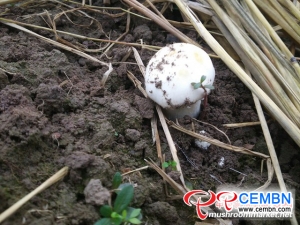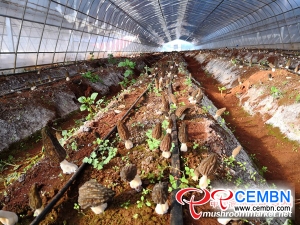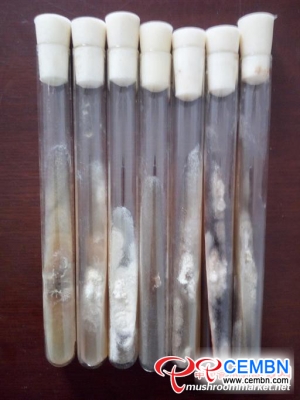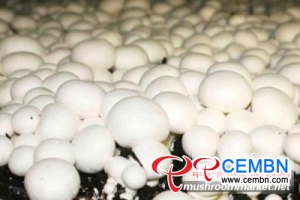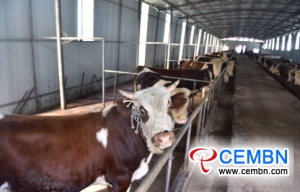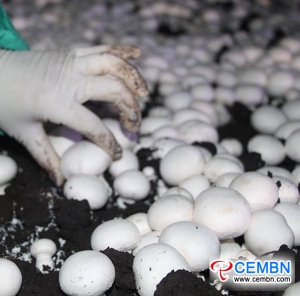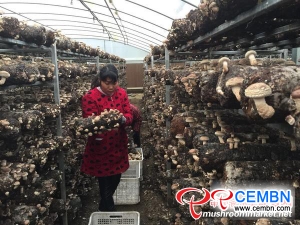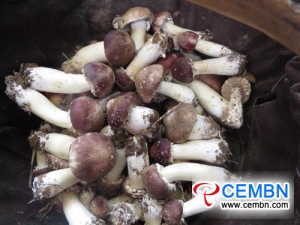
Mushroom Matter
Welcome on our platform. Why MUSHROOM MATTER? Because mushrooms play an important role in our lives as well in business. Our goal is to bring the world the very latest mushroom news with the upmost care to support the positioning of our beloved Mushroom.
Recently, a White Stropharia rugoso was surprisingly found in Huangshi Village, Xuyong County, Sichuan Province of China.
“It is undoubtedly the new variety of Stropharia rugoso went by natural variation, it is also the highest quality among all mushroom varieties and it plays significant importance to scientific mushroom cultivation and industrial development,” introduces Agricultural Department of Sichuan Province in excitement.
In order to determine natural variation of the white Stropharia rugoso as genotypic variation and acquire new Stropharia rugoso variety, the pure white treasure was taken back to local Agricultural Bureau and was finally affirmed as natural variation, later, technical staffs conducted tissue isolation, collected its white gene, carried out the breeding experiment and harvested a lot.
Now you can cultivate Morels at all seasons
As a kind of high-end mushroom variety, Morels keep on gaining popularity by customers in virtues of abundant nutrition and tender flavor. Besides, as the variety which holds scarce market, market price of dried Morel once reached 2000 CNY per kg in China.
Learned from Kunming Institute of Botany of Chinese Academy of Sciences, On 19th of January, new movements were given out on Morel cultivation by maven, which indicates a new circumstance -Morel cultivation at all seasons.
Over the years, motivated by economic profits, wild Morels have been excessively foraged in most regions of China, which almost results in Morel extinction. However, along with its smooth wild domestication and artificial cultivation, market demand has been gradually eased. In addition, by reason of preference on low temperature, Morel sowing is usually done in winter while picking season arrives in spring in China, which leads to stockpiling in peak season and low price.
After 20 years of dedicated exploration, new mode of Morel cultivation has been successfully developed in Kunming Institute of Botany of Chinese Academy of Sciences. On aspect of that, cultivation period could be shortened from 120-180 to 60-100 days while success rate is improved by 20%-30%.
In Yunnan, Sinkiang and other 7 provinces of China, demonstrative cultivation that covers over 10,000 mu has been promoted, pure incomes on each mu attain at least 8000 CNY per season.
Artificial domestication of wild Coral fungus: Formula of mother strain was singled out
On 25th, January, through tissue isolation, pure mother strain of wild Coral fungus collected by Puwa Village, Fangshan District, Beijing was obtained, and formula of mother strain was also singled out after formula experiment.
According to know, the experiment determined different Nitrogen and Carbon sources as influence factors, and 8 formula combinations were designed. After the inoculation, technical staffs evaluated on aspect of growth speed, growth tendency and uniformity of mycelia, finally a mycelia formula which highlights quick growth speed, even and dense mycelia was sorted out. Now, it is used for production and preservation and is expected to be improved via subsequent experiment.
Industrialized mushroom factory which holds 126 million CNY of investment is in fevered construction
Recently, industrialized mushroom project which holds 126 million CNY of gross investment launched its construction.
“The project is expected to be put into production in August, the anticipated fruiting time is in October and daily output on Button mushroom attains 20 tons,” said chairman from Jiangsu Honglu Agricultural Technology Co., LTD passionately.
With Dutch control system of Button mushroom production and internationally-advanced equipment, 16 primary fermentation tunnels and 8 secondary fermentation tunnels are in planned construction, besides, at least 200 rural labors could be leaded to launch into the industry and generate handsome revenues after the formal production.
In recent years, mushroom project that highlights the cyclic steps of “Sugarcane - Cow - Mushroom - Fertilizer” keeps on gaining great attentions. As the implementation site, Banle Village, Ningming County, Guangxi Zhuang Autonomous Region strives to boost agricultural benefits and realize cyclic utilization of resource via the project.
On September, 2017, a cattle farm was established in Banle Village, gross amount reached over 100 cattle. As the neighbour, a mushroom house was subsequently built in October and trial Agrocybe cylindracea cultivation implemented via cow dung and other compost mixtures was launched. Till now, 2 batches of picking have been achieved, and economic incomes have attained 3000 CNY.
Besides, in Bangun Community that is two kilometers far away from Banle Village, headquarters of the project is in intense construction. On construction site, main work of mushroom base and processing factory of organic fertilizer has been accomplished, workers are engaged with installation of necessary equipment.
“We take cow dung as base stock of mushroom cultivation, the expected mushroom varieties include Button, Shiitake, Agrocybe cylindracea and Straw mushroom,” introduces project leader as well as the chairman of Ningming Luoye Agricultural Development Co., LTD passionately, going on that the base engages in mushroom cultivation with agricultural wastes, after the disposal through fixed procedures, mixture of cow dung is used for cultivation of Straw, Button and Agrocybe cylindracea in proper sequence, then waste impurities which run out of nutrients are sent to processing factory for fertilizer production so as to re-cultivate sugarcane, corn and other crops, which clearly manifests an industrial chain dominated by cattle and underlined on symbiotic development of multiple industries.
Winter is the peak marketing season of mushrooms, now, Oyster, Enoki, Drumstick and White mushroom are superior varieties which lead large sales volume in China. Since the end of May, 2017, market price of Button mushroom has been gradually rising in the majority of Chinese vegetable markets.
Now, in production workshop of Jiangsu Minzhong Organic Food Co., LTD, pure-white Button mushrooms are vigorously popping their heads out of fungus bed while staffs are engaged with the picking and packaging work.
“At present, daily output on Button mushroom attains 20 tons, and they are thoroughly in short supply,” introduces general manager of Minzhong Company.
Over the years, during the adjustment process of agricultural structure, Chinese Button mushroom industry has been evolving into an active one in many regions, characteristic raw materials used for Button mushroom cultivation include wheat straw, stalks, chicken manure, cow dung and others. The rapid development of mushroom industry facilitates transforming waste agricultural straws into high-nutrition mushrooms, and cultivation wastes could be reused as organic fertilizer that improves soil, which boosts a sustainable benign ecological circular agriculture.
After years of development, Chinese Button mushroom industry has witnessed its rapid growth, especially in recent 3 years, all the nationalized industrialized Button mushroom enterprises have been built and put into production, which accumulates valuable experience for China to carve out a characteristic cultivation path.
According to statistics, in 2017, among all the Chinese industrialized mushroom enterprises, 47 enterprises mainly engage in Button mushroom production, which accounts for 8.88% of national gross volume of mushroom enterprise. Of variety composition of daily gross output, industrialized Button mushroom reaches 434.76 tons, which drops by 236.85 tons compared with 2016 and shows 35.27% of dropping degree.
In previous years, restricted by large investment and high comprehensive technology, Chinese industrialized Button mushroom industry experienced slow development speed while it gained stable output. In recent two years, by virtue of considerable market price of Button mushroom and price decline of equipment import, many production projects of industrialized Button mushroom have been preferred by several main production regions and investors in China.
Learned from Entry-Exit Inspection and Quarantine Bureau of Nanyang City, Henan Province of China, in 2017, value of mushroom export came to 880 million USD in the city, which accounted for above 30% of agricultural food products of Henan Province.
Embraced on trade barrier breaking on mushroom export technology, and enhancement of quality of mushroom products, Nanyang Entry-Exit Inspection and Quarantine Bureau insists on intensifying scientific research, by now, over 10 scientific research projects have been developed in the bureau, meanwhile, in order to promote the transformation of scientific payoffs, a modernized mushroom laboratory which holds over tens of millions CNY has been built while the quality of personnel and technical service quality and efficiency has been constantly improved.
In 2015, Dongfeng County, Jilin Province of China started to vigorously support mushroom industry, by the end of 2017, 216 mushroom households have been developed, 30.24 million bags of mushroom have been cultivated, of which Black fungus occupies 24 million bags.
On aspect of Stropharia rugoso-annulata cultivation, cost and output on each greenhouse respectively reaches 6000 CNY and 2000 kg in case of fermentation of corn stalks, rice husks and deer dung, to calculate by unit price of 7 CNY per kg, output value on each Stropharia rugoso-annulata greenhouse attains 14,000 CNY while profits come to 8000 CNY.
This year, Dongfeng County intends to focus on cultivation of Black fungus, Shiitake, Stropharia rugoso-annulata and Nameko, strives to build above 50 high-standard demonstration gardens, 1000 mushroom greenhouses, expand cultivation scale to 400,000 square meters, attain 12,000 tons of gross output and above 100 million CNY of output value. By 2020, number of high-standard demonstration garden and greenhouse is going to respectively reach 100 and 2000 while the expected gross output and output value obtains 24,000 tons and over 200 million CNY in respective.














